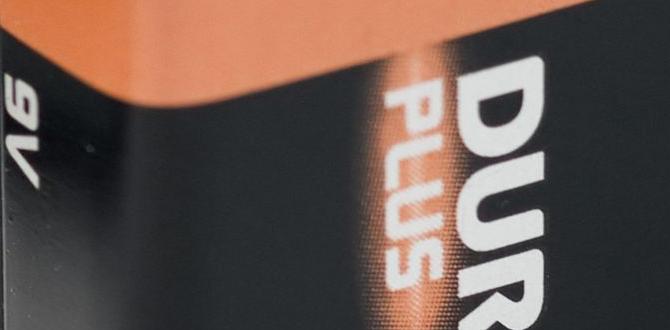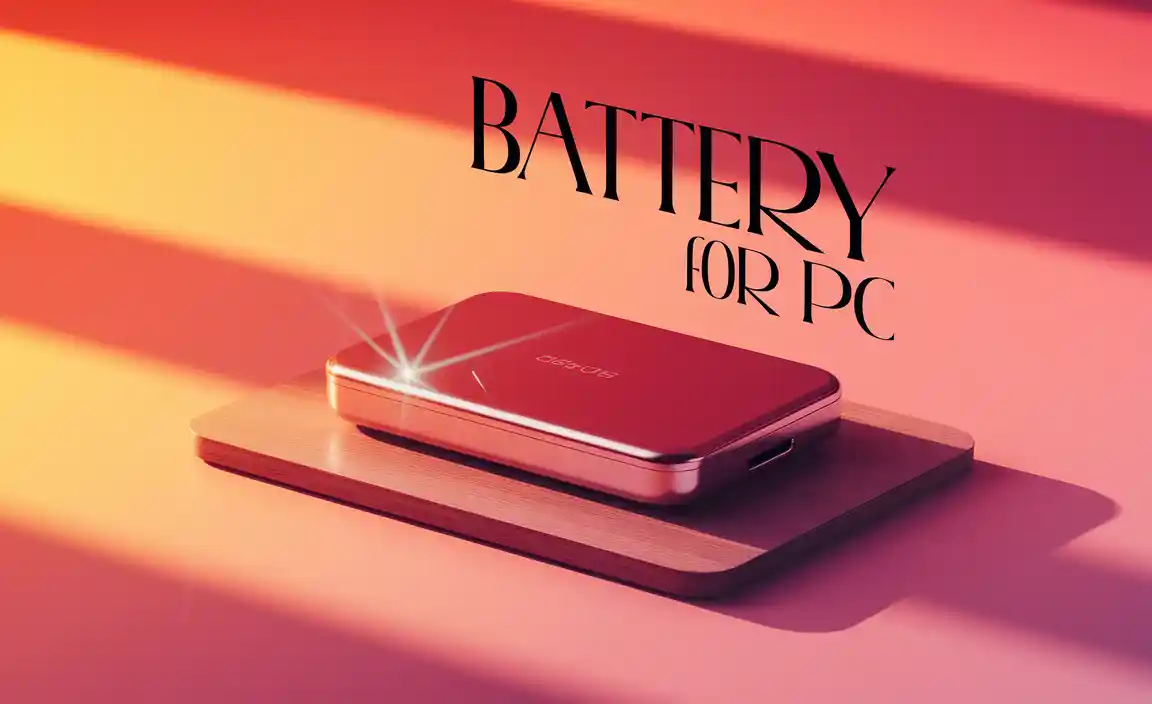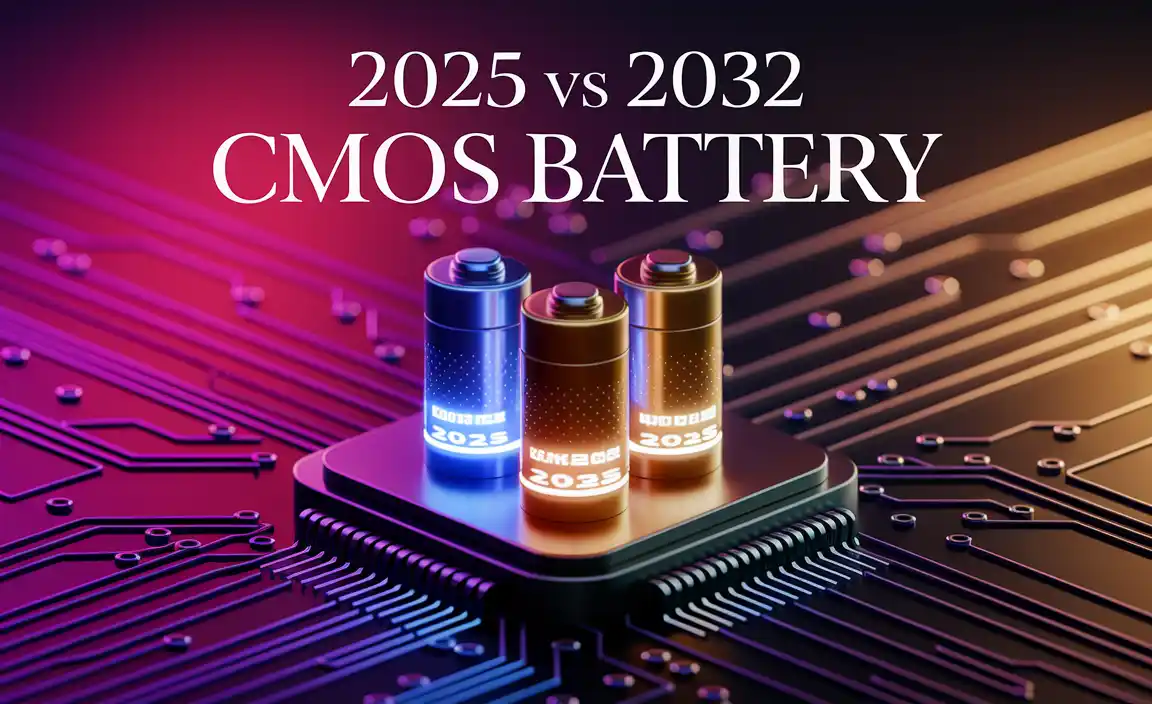Quick Summary:
Choosing the right 12V car battery for your Toyota Corolla means matching it to your car’s needs and your driving habits. Look for reputable brands offering reliable performance, proper fitment (group size), and a good warranty. We’ll break down the key factors to help you make the best choice with confidence.
Is your Toyota Corolla having trouble starting? A healthy car battery is the heart of your vehicle’s electrical system, and sometimes, it just needs a refresh. It can be a bit confusing to figure out which 12V battery is the right one with so many options out there. But don’t worry! This guide will walk you through everything you need to know, making it simple to pick the perfect battery for your Corolla. We’ll cover the essential features, give you tips on making the best choice, and even show you how to compare them. Get ready to give your Corolla the power it deserves!
Understanding Your Toyota Corolla’s 12V Battery
Your car’s 12-volt battery is an amazing piece of technology. It’s not just there to start your engine; it also powers all your car’s electronics when the engine is off and helps to stabilize the electrical system when it’s running. Think of it like a rechargeable power bank for your car. When the engine is off, it’s the sole provider of electricity for lights, the radio, and those essential onboard computers. When the engine is running, the alternator takes over most of the power needs, but the battery still plays a crucial role in smoothing out power surges and dips.
The “12V” in 12-volt battery refers to the nominal voltage it operates at. This is standard for almost all passenger vehicles. For a Toyota Corolla, like most cars, this battery is a lead-acid battery, which has been the workhorse for decades due to its reliability and cost-effectiveness. Inside, it contains lead plates submerged in a sulfuric acid electrolyte. When you start the car, a chemical reaction releases electrical energy. To keep it going, the alternator recharges the battery as you drive.
When it’s time to replace your Corolla’s battery, you’ll come across different types and specifications. The most important things to remember are the battery’s group size, terminal type, and Cold Cranking Amps (CCA). Getting these right ensures a proper fit and enough power to start your car, especially in cold weather.
Why Battery Choice Matters for Your Corolla
Choosing the wrong battery can lead to a host of problems, from minor annoyances to bigger issues. An underpowered battery might struggle to start your car, especially on a chilly morning. This can leave you stranded and frustrated. A battery that doesn’t fit correctly could rattle around, damaging connections or even the battery tray itself. Worse, an incompatible battery might not provide enough power for your car’s modern features, like advanced infotainment systems or safety sensors, potentially causing them to malfunction or fail.
Conversely, the right battery ensures your Corolla starts reliably every time. It provides consistent power to all your vehicle’s systems, contributing to smoother operation and preventing electrical glitches. A good quality battery also lasts longer, saving you money and hassle in the long run. Think of it as investing in your car’s overall health and your peace of mind.
Key Factors to Consider When Comparing 12V Batteries
When you start looking at batteries for your Toyota Corolla, you’ll encounter several important specifications. Let’s break them down so you know exactly what to look for:
- Group Size: This is the most critical physical specification. It determines the battery’s dimensions (length, width, height) and where the terminals are located. For a Toyota Corolla, you’ll typically find common group sizes like 24F, 35, or a similar designation depending on the specific model year and trim. Always check your owner’s manual or consult a reliable source to confirm the correct group size for your Corolla. A mismatch here means the battery won’t fit in your car’s battery tray or the cables won’t reach the terminals.
- CCA (Cold Cranking Amps): This rating tells you how much electrical current the battery can deliver for 30 seconds at 0°F (-18°C) while maintaining a minimum voltage of 7.2 volts. This is especially important if you live in a colder climate. Higher CCA means the battery is better equipped to start your engine in very cold conditions. Your Corolla’s manufacturer will specify a minimum CCA requirement, and it’s generally a good idea to meet or slightly exceed it.
- RC (Reserve Capacity): Reserve Capacity measures how long a fully charged battery can deliver power at a specified discharge rate (usually 25 amps) before its voltage drops too low to be useful. This is important if you often find yourself using accessories with the engine off, like the radio or chargers. A higher RC means your battery can power accessories for a longer period on its own.
- Warranty: Car batteries are an investment, and a good warranty provides peace of mind. Warranties vary, but you’ll often see them broken down into a “free replacement period” (e.g., 1-3 years) and a “pro-rated period” (where you get a discount on a new battery based on how long you’ve owned the old one). Longer free replacement periods are generally better.
- Brand Reputation and Reviews: Some battery brands have a long-standing reputation for quality and reliability. It’s worth looking at customer reviews and professional testing reports from reputable automotive sources. Brands known for good performance and customer service can be a safer bet.
- Battery Type (Flooded vs. AGM): Most standard car batteries are “flooded” lead-acid batteries, which are cost-effective and reliable. However, some newer vehicles, especially those with start-stop technology or high electrical demands, may require an Absorbed Glass Mat (AGM) battery. AGM batteries are more durable, resistant to vibration, and can handle deeper discharges. Check your owner’s manual to see if your Corolla specifically requires an AGM battery. Replacing a standard battery with an AGM is often an upgrade, but replacing an AGM with a standard flooded battery can cause issues.
Step-by-Step Guide: Comparing 12V Car Batteries for Your Corolla
Ready to find the perfect battery for your Toyota Corolla? Follow these straightforward steps:
Step 1: Identify the Correct Battery Group Size
This is the absolute first step. Your car is designed for a specific physical size and terminal orientation. Trying to fit a battery that’s too big, too small, or has terminals on the wrong side will cause problems.
- Check Your Owner’s Manual: This is your definitive guide. It will list the recommended battery group size for your Corolla.
- Look at Your Current Battery: Most batteries have the group size (e.g., 24F, 35) printed on a label. Note this down, but also verify it against your manual.
- Consult Online Resources: Many auto parts store websites allow you to enter your car’s make, model, and year to find compatible batteries. Use these as a reference but always double-check with your owner’s manual.
Step 2: Determine Your Minimum CCA Needs
Cold Cranking Amps are crucial for starting your engine, especially in winter. Your owner’s manual will usually state the minimum CCA requirement. If you live in a very cold climate, consider a battery with a slightly higher CCA than the minimum specified. This provides an extra buffer for those frigid mornings.
Step 3: Research Reputable Brands and Models
Now that you know the specs, it’s time to look at actual batteries. Focus on brands with a good reputation for longevity and reliability. Some well-regarded brands include:
- Die Hard: Often found at Advance Auto Parts, known for good performance.
- Optima: Higher-end, known for their unique YellowTop and RedTop AGM batteries, offering superior vibration resistance.
- Interstate Batteries: Widely available and generally considered reliable.
- ACDelco: A trusted name in automotive parts.
- Duralast: AutoZone’s house brand, offering a range of options.
- EverStart: Walmart’s brand, often a budget-friendly choice.
Don’t just pick a brand; look at specific models within those brands that meet your Corolla’s requirements. Read online reviews from other Toyota Corolla owners if possible.
Step 4: Compare Warranties and Prices
Batteries can range in price from under $100 to over $200. A higher price often reflects better materials, longer lifespan, or a more robust warranty. Compare the free replacement period and the pro-rated period. A battery with a 3-year free replacement warranty is generally a better value than one with a 1-year free replacement, even if the initial cost is higher.
Consider your budget, but remember that a cheap battery that fails prematurely can cost you more in the long run due to towing fees, missed work, and the hassle of an unexpected replacement.
Step 5: Check Reserve Capacity (RC) and Other Features
If you often listen to music with the engine off, use a GPS for extended periods, or have many aftermarket accessories, a higher Reserve Capacity can be beneficial. For most daily drivers, the manufacturer’s specified RC or a moderate level is usually sufficient. Also, confirm if your Corolla has specific needs like an AGM battery, especially if it came from the factory with one or has advanced features like an automatic start-stop system.
Step 6: Consider Installation and Disposal
Some people prefer to install a new battery themselves, while others prefer to have it done professionally. Many auto parts stores offer free battery installation when you purchase a battery from them.
When you get a new battery, you’ll need to dispose of your old one responsibly. Most places that sell car batteries will take your old one back for recycling. This is important because old car batteries contain lead and acid, which can be harmful to the environment if not handled properly. You can also often get a small core charge refund when you return your old battery.
Comparing Top 12V Battery Choices for Toyota Corolla (Examples)
To give you a clearer picture, let’s look at a hypothetical comparison of battery types you might find for a common Toyota Corolla model. (Note: Specific models and availability can vary by year and region. Always check fitment for your exact vehicle.)
Here’s a table comparing a few potential options:
| Feature | Budget Option (e.g., EverStart Maxx) | Mid-Range Option (e.g., Duralast Gold) | Premium Option (e.g., Optima YellowTop) | OEM Equivalent (e.g., Genuine Toyota Battery) |
|---|---|---|---|---|
| Group Size | 35 | 35 | 35 (or specific Optima model) | 35 |
| CCA (Approx.) | 500-550 | 600-650 | 750 (for starting applications) | 550-600 |
| RC (Approx.) | 80-90 min | 100-120 min | 120 min (deep cycle capable) | 90-110 min |
| Battery Type | Flooded Lead-Acid | Flooded Lead-Acid | AGM (Absorbed Glass Mat) | Flooded Lead-Acid |
| Warranty (Free Repl.) | 3 Years | 3 Years | 3 Years | 2 Years (often) |
| Price Range ($) | $90 – $120 | $130 – $170 | $250 – $300+ | $150 – $200 |
| Pros | Affordable, readily available | Good balance of performance and price, reliable | Excellent performance, vibration resistance, deep cycle capability, longer lifespan if maintained | Guaranteed fit, designed for the vehicle |
| Cons | Potentially shorter lifespan, lower RC | Good all-rounder, no major cons for average user | Expensive, may be overkill for standard use | Can be more expensive than aftermarket, warranty may be shorter than some aftermarket brands |
Important Note: The “OEM Equivalent” is often a good starting point. However, many reputable aftermarket brands offer batteries that exceed the performance and warranty of original equipment manufacturer (OEM) batteries at a better price. Always verify the specific group size and terminal orientation (positive on the left or right when facing the sticker) for your Corolla year.
Battery Maintenance Tips for Longevity
Once you’ve chosen and installed your new battery, a little care can go a long way in extending its life:
- Keep Terminals Clean: Corrosion can build up on the battery terminals, hindering electrical flow. Periodically check them and clean off any white or bluish powdery substance with a wire brush and a mixture of baking soda and water. A dielectric grease can help prevent future corrosion.
- Ensure a Secure Fit: A loose battery can vibrate and damage its internal components or your car’s battery tray. Make sure the hold-down clamp is snug.
- Avoid Deep Discharges: Don’t leave your headlights on or drain accessories extensively with the engine off, as this puts a strain on the battery. Regular starting and driving help recharge it.
- Check for Leaks or Damage: Inspect your battery regularly for any signs of swelling, cracking, or fluid leaks. If you see any of these, the battery needs to be replaced immediately for safety.
- Protect from Extreme Temperatures: While batteries are designed to withstand a range of temperatures, constant exposure to extreme heat or cold can shorten their lifespan. Parking in a garage can help.
Frequently Asked Questions (FAQ)
Q1: How often should I replace my Toyota Corolla’s battery?
Most car batteries last between 3 to 5 years. However, this can vary depending on your climate, driving habits, and battery quality. It’s a good idea to have your battery tested during regular maintenance checks, especially as it approaches the 3-year mark.
Q2: Can I use a battery with higher CCA than recommended?
Yes, generally, using a battery with a higher CCA rating than recommended is perfectly fine and even beneficial, especially in colder climates. It provides more starting power. However, you must ensure the battery’s group size and physical dimensions are correct.
Q3: What does “AGM” battery mean for my Corolla?
AGM stands for Absorbed Glass Mat. These are a type of valve-regulated lead-acid battery that uses a glass mat to absorb the electrolyte. They are more efficient, durable, vibration-resistant, and can handle deeper discharges than traditional flooded batteries. Many modern cars with advanced features like start-stop systems require AGM batteries. Check your owner’s manual to see if your Corolla needs one.
Q4: Can I use a battery with a different group size than my Corolla originally had?
It’s strongly advised against using a different group size unless specifically recommended by a reliable automotive professional or a very reputable vehicle-specific forum for a particular modification. Group size dictates not only physical dimensions but also terminal placement, which is critical for cable connections and secure fitment.
Q5: What are the symptoms of a failing car battery?
Common signs include a slow engine crank (a grinding or struggling sound when starting), dim headlights or interior lights, unusual clicking sounds when trying to start, dashboard warning lights (battery indicator), and a swollen or leaking battery case. If you notice any of these, get your battery tested immediately.
Q6: Is it cheaper to replace my Corolla battery myself?
For many DIYers, yes, it can be cheaper as you save on installation labor costs. The process is usually straightforward, involving disconnecting the old battery and connecting the new one. However, many auto parts stores offer free installation with purchase, so the cost difference might be minimal.
Q7: Where can I find reliable information about battery specifications for my specific Toyota Corolla model year?
Your car’s owner’s manual is the best source. Reputable automotive websites, such as those from major auto parts retailers (e.g., AutoZone, Advance Auto Parts, O’Reilly Auto Parts), also have extensive databases where you can input your vehicle’s details to find recommended battery group sizes and specifications. Websites like Consumer Reports often conduct battery tests and reviews.
Conclusion
Selecting the correct 12V car battery for your Toyota Corolla doesn’t have to be a complex task. By focusing on the essential factors—primarily the correct group size, sufficient Cold Cranking Amps, and a reliable warranty—you can confidently



